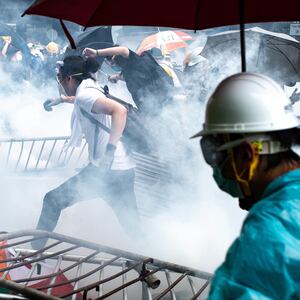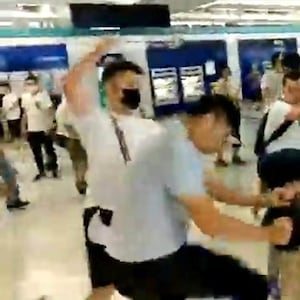Xi Jinping’s choices on Hong Kong are all atrocious, so the Chinese ruler could just enlarge the problem and cause an incident elsewhere. An audacious act would not be out of character for Xi.
For many, an invasion of Taiwan or some other belligerent act seems inconceivable, but the events of the last few weeks have been nothing short of extraordinary. Unfortunately, anything can happen now.
Beijing made headlines on Wednesday when Wu Qian, a Chinese Defense Ministry spokesman, called last weekend’s protests in Hong Kong “absolutely intolerable” and suggested China might send in troops, pointing out that the Basic Law, Hong Kong’s “mini constitution,” allowed the Hong Kong government to request the assistance of the Chinese military.
Since April, there have been large-scale protests in the territory, a special administrative region of the People’s Republic. The demonstrations started over an extradition bill, sponsored by Hong Kong’s Chief Executive Carrie Lam. The bill would permit fugitives to be sent to, among other jurisdictions, mainland China.
Last weekend, the number of demonstrators was significantly less than in June but the nature of the disturbances was of far greater concern for Beijing. The seventh straight weekend of protests saw young demonstrators deface the emblem of the People’s Republic, hung on the side of the central government’s liaison office, and spray paint graffiti on the building.
Moreover, it was evident by Monday and Tuesday that many Hong Kongers supported—or at least tolerated—the vandalism directed against the central government.
And if that were not bad enough, Beijing must have realized it could no longer rely on the Hong Kong police to maintain order. The police, for instance, on Sunday had allowed thugs, dressed in white shirts, to indiscriminately assault dozens of passengers in a Mass Transit Railway station in Yuen Long, in the New Territories, the northern part of Hong Kong. News of the impending attack had been spread by social media, so the failure of the police to prevent it was deeply troubling.
In fact, the police had abandoned the site of the attack, allowing gang members, thought to be from the pro-Beijing Heung Yee Kuk association, to go on their violent spree. Many of the goons did not wear masks, suggesting they were acting without fear of the police.
Wednesday, the Hong Kong government’s Security Bureau said it did not need the help of the local garrison of the People’s Liberation Army.
Xi Jinping is not the type of leader to allow events to take their course in unfavorable directions, so it’s unlikely he is content with the deteriorating situation in Hong Kong.
Xi knows that people on the mainland do not sympathize with the Hong Kong protestors, but he is undoubtedly worried that those demonstrators, who forced a concession from Lam by “suspending” consideration of the extradition bill, will inspire mainland people to protest about their other grievances.
On July 7, Hong Kong protestors congregated near both a mall and a high-speed rail station frequented by Chinese tourists. At about the same time, youthful protesters in Hong Kong used AirDrop to share protest posters written in the simplified characters used in the mainland, thereby targeted Chinese tourists.
At about the same time, mainland citizens in Wuhan participated in large-scale protests. Hong Kong activists have linked the Wuhan and Hong Kong demonstrations in messages directed at mainland tourists.
The concern of contagion is almost certainly why early this week Beijing went from trying to eradicate Hong Kong news in the mainland to showing images of the defacement of the central government emblem, an attempt to discredit the Hong Kong protesters.
And Beijing attempted to stir up emotions.
That suggests Xi does have one other option. If he feels the situation in Hong Kong is no-win for him—and given the trend of events how could it not be?—the Chinese leader could cause mischief abroad in hopes of creating internal unity. He did, after all, have Wu, the military spokesman, make unprovoked threats against Taiwan on Wednesday. “If anyone dares to separate Taiwan from China, the Chinese military would not hesitate to go to war,” he said.
Apparently someone in the Pentagon is worried. The USS Antietam, a Ticonderoga-class guided-missile cruiser, sailed through the Taiwan Strait right after the provocative Chinese Defense Ministry pronouncements on Hong Kong and Taiwan.
Everyone needs to be concerned about what Xi does next.








